Peter Hessler (China) Discovers Egypt
Editor John Coyne talks with Peter Hessler (China)
Peter Hessler Discovers Egypt
Peter Hessler is a 1992 graduate of Princeton University, a Rhodes Scholar at Oxford, and was a Peace Corps Volunteer in China from 1996 to 1998. Since that time he has worked in China as a freelance writer for numerous publications such as the Wall Street Journal, Boston Globe, South China Morning Post, and National Geographic. In 2008, he won the National Magazine Award for excellence in reporting, and since 2000 he has been a staff writer at The New Yorker.
Hessler has written four books on China. River Town: Two Years on the Yangtze, which won the 2001 Kiriyama Book Prize, describes Hessler’s experience as an English teacher in Fuling, a small city on the Yangtze River. Oracle Bones: A Journey Through Time in China, a finalist for the 2006 National Book Award, explores the intersection between China’s ancient history and the current fast-changing society. In Country Driving: A Journey from Farm to Factory (2010), Hessler traces the impact of the Chinese auto boom on the country. Strange Stones: Dispatches from East and West (2013) is a collection of Hessler’s best work from The New Yorker.
 In 2011, Peter and his wife Leslie T. Chang, also a writer, author of Factory Girls: From Village to City in a Changing China (2009), and their infant twin daughters, moved to Cairo from their home in Ridgway, Colorado. Drawn by a fascination with Egypt’s rich history and culture, Hessler and Chang planned to study Egyptian Arabic. As The New Yorker’s Egypt correspondent, Hessler covered the events of the Egyptian Arab Spring, and he also explored the legendary archaeological digs of Upper Egypt. This May, 2019, Penguin Press will publish his new book, The Buried: An Archaeology of the Egyptian Revolution.
In 2011, Peter and his wife Leslie T. Chang, also a writer, author of Factory Girls: From Village to City in a Changing China (2009), and their infant twin daughters, moved to Cairo from their home in Ridgway, Colorado. Drawn by a fascination with Egypt’s rich history and culture, Hessler and Chang planned to study Egyptian Arabic. As The New Yorker’s Egypt correspondent, Hessler covered the events of the Egyptian Arab Spring, and he also explored the legendary archaeological digs of Upper Egypt. This May, 2019, Penguin Press will publish his new book, The Buried: An Archaeology of the Egyptian Revolution.
•
Peter, let’s talk first about writing your new book. How long was your first draft of The Buried: An Archaeology of the Egyptian Revolution?
Too long! But invariably my first drafts are very long and a big part of my editing process is cutting down the length. I probably cut 80 or more pages from the first draft. That’s typical — but for this book I also made substantial additions. I realized that there was another story I wanted to tell, about an Egyptian I knew who eventually fled to Germany. I had left it out of the first draft for various reasons, one of them being that his story was unresolved at that point. But eventually he received asylum and he was interested in telling his story, so I decided to revise the book so that it included him.
There were other things that came up unexpectedly. After I finished my first draft, I wrote an essay for The New Yorker about living in Cairo with my family. I described the apartment where we lived in Egypt, and a reader wrote me asking me for the address of the building. From my description, he thought that it might be the same place where he grew up as a child in the 1940s and 1950s. I had always wondered about the history of the building, which was a distinctive Art Deco structure on Zamalek, an island in the Nile.
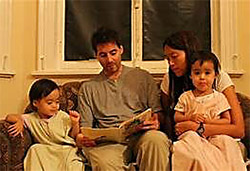 We corresponded and I learned that his grandparents had constructed the building, in the 1930s. They were Egyptian Jews who were driven out of the country not long after the revolution of 1952. The man who contacted me had actually lived in the same apartment as us. Even more amazing was that he had identical-twin sisters. He sent old black-and-white photos of the twin baby girls in the apartment, and meanwhile I had photos of my own identical-twin baby girls in the same places.
We corresponded and I learned that his grandparents had constructed the building, in the 1930s. They were Egyptian Jews who were driven out of the country not long after the revolution of 1952. The man who contacted me had actually lived in the same apartment as us. Even more amazing was that he had identical-twin sisters. He sent old black-and-white photos of the twin baby girls in the apartment, and meanwhile I had photos of my own identical-twin baby girls in the same places.
One of the major themes of the book is history, and I describe the ways in which time often seems circular or repetitive, with certain patterns recurring. Learning about the former residents of my apartment, and how they had been affected by an earlier revolution, gave me a deeper perspective on the revolution that my own family witnessed from 2011 to 2016.
Talk about the structure of the book. You are writing about yourself and your young children, observing the Arab Spring, studying Arabic, visiting archaeological sites in Upper Egypt. And at the same time researching and writing articles for The New Yorker.
The book covers a lot of ground. There are some similarities to Oracle Bones, my second book from China, in that it explores connections between the ancient past and contemporary events. I think that it’s important to think about such links, especially in countries like Egypt and China, where the past is everywhere.
I also like the challenge as a writer. With every book, I’m building on my previous experiences, but I’m also trying to find new ways to tell a story. In this case I arrived in Egypt during the first year of the Arab Spring. I’ve never had that experience before, of being in the midst of a revolution, and covering a coup, the trial of a former president, and other significant historical events. So I wanted to find a way to include this material in a literary book.
There are different threads that run throughout the book. One is the story of the Egyptian Arab Spring, and another is the investigation of the ancient past. There’s a personal element, connected to the experience of arriving in Egypt with small children, and living in a distinctive and interesting part of the city. And then there are a number of main characters.
Sayyid, a garbage collector who worked in my neighborhood, introduced me to the ashwa’iyat, the “informal” parts of Cairo where most residents live. Rifaat, who taught Leslie and me Arabic, provides an introduction to the Egyptian language, as well as a sense of what the country is like for an educated middle-class person. And Manu, a young gay Egyptian, gave me so much insight into issues of gender and youth. I also have a couple of chapters that describe Chinese merchants in Egypt. I’m interested in different perspectives — through the course of the book, and through the eyes of these various characters, the reader looks at Egypt from many different angles.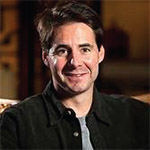
As a writer, I want to give the reader important cultural and historical background. But I also want to capture the beauty of the landscape and the trajectories of these stories. These are the elements that are more literary. There’s a real drama to the events of the revolution, and each of the main characters has a personal story that proceeds in unexpected ways.
What about fact-checking that is historically and politically relevant?
I was fortunate to do early work on many subjects in the book for The New Yorker and National Geographic. The book is in a very different form, but many elements began with articles that were fact-checked by the magazines. So that was helpful. My publisher, Penguin, also hired an Arabic-speaking fact-checker to go through material, and I sent archaeological sections to various Egyptologists. And I spent days checking things on my own, especially the political events. At this point, after so many years of writing, I’m aware of how important it is to be accurate, and I keep my notes very carefully organized so that I can go back to my sources. This book has an extensive sources-cited section. I don’t use footnotes, because I find them distracting on the page, but at the back of the book I note where each fact came from. I want readers to know my sources and I want to assist others who are researching similar topics.
As I understand it, you wrote your first draft after you and your family returned to the U.S. Did you need any resources to do that in terms of fact checking, etc?
At this point, I’ve done it in many ways. For River Town, I left the Peace Corps and returned to my parents’ home in Missouri, where I wrote the first draft of the book. I wrote Oracle Bones while still living in Beijing. And then I wrote Country Driving after leaving China and finding a new home in Colorado. It works anywhere — if you have a story to tell, and if you are truly committed, you will find a way.
But I prefer to write a book after leaving a place. I think that the distance helps. And it’s good to write in a familiar environment that is quieter and calmer. Egypt is so intense, and it can be chaotic; we’d often lose electricity or water in our apartment. It’s better to write without such distractions. I was happy to be back in southwestern Colorado for that part of the process.
During the period in which I was writing, I made two long trips back to Egypt, and another trip to Germany, in order to complete the research. So while the book covers events from the years we lived there, 2011 to 2016, it also follows some stories all the way to the end of 2018.
When you graduated from Princeton, you went to England as a Rhodes Scholar. After that, in 1994, you decided to travel home by way of China. Tell us how that decision changed your life as a writer.
I felt very uncertain at Oxford. The Rhodes scholarship is a big deal, and it generally directs people toward very successful careers, often in politics or academia. But I had always wanted to be a writer, and I sensed that the scholarship, and the world in which I was living, might not be right for me. Princeton was a big transition from Columbia, Missouri, where I had grown up, and Oxford was another transition.
I felt like I was proceeding along a track in which it would be easy to remain connected to elite institutions and highly educated people. But I sensed that this would not be good for me as a writer.
Every writer is different, and what works for one person won’t work for another. At Oxford I still thought that I might become a fiction writer, although I wasn’t certain. I was also developing an interest in nonfiction. So there was a lot of uncertainty. But one thought that consistently came to me was that I had to step away from this track of privilege. It wasn’t what I had grown up with — my parents were very well educated, but they didn’t have a lot of money, and I attended Princeton on a Pell grant. I went to a big, fascinating public high school in Missouri that had a lot of racial and socioeconomic disparity. –I liked interacting with people from different backgrounds and trying to understand their perspectives. I sensed that this was probably a skill that I should try to develop in some way. Also, I had not learned a foreign language in high school and — actually I had not even travelled outside of the US during those years.
As a senior at Princeton, I applied to the Peace Corps at the same time that I applied to the Rhodes scholarship. I went through the initial interviews and the Peace Corps seemed likely to send me to Africa. But I pulled the application when I received the scholarship. Then, as I finished Oxford, I realized that I wanted to return to that earlier plan. I felt like the Peace Corps would be the best way to step off the Princeton-Oxford track. And I wanted to learn a language.
But I didn’t know where exactly I wanted to go. I also didn’t know what kind of writing I hoped to do, in the long term. So I decided to return home from Oxford to the east, going around the world. With a friend, I flew to Prague, and then we spent six months making our way across Eastern Europe, Russia, and Asia. We did it all by land or boat – we took the trans-Siberian train across Russia and Mongolia, and then we travelled through China and into Vietnam, Laos, and Thailand. This was in 1994, really pre-Internet, and the world felt much bigger than it does now.
It was a wonderful experience. I did a lot of travel writing based on that trip — my first significant publication was an essay about the trans-Siberian train ride, for the New York Times. I wrote about other places for other newspapers, mostly travel articles. And during this trip I was always thinking about the next stage, when I would find a way to become rooted in one place. I saw the trip as a survey— I would see a bit of the world and then commit to a country, a language, a community.
During the trip I was most fascinated by China. There was a tangible energy there; I sensed that things were happening, that people were energized. When I returned home, I learned that the Peace Corps had opened a new program in China, so I re-applied and told the recruiters that I wanted to go there.
I was fortunate that all of this worked out. A lot of it was haphazard and there was so much luck involved. But I also had some good instincts. I was right to step away from the elite institutions — it was time to learn something different. The Peace Corps forced me to grow up, and so many of those experiences were humbling. I struggled with Chinese in the early months, and I was trying to be a good teacher in a new and complicated culture. I made a lot of mistakes. But I was committed to the job, and to learning Chinese, and by the end I gained confidence and maturity. That maturity translated into much better writing. I didn’t enter the Peace Corps with the plan of writing a book, but by the end it suddenly made sense. I realized that I was ready to write with real depth.
This experience also taught me that a writer can’t get too comfortable. You don’t want to be in the same place
forever, writing the same way, and you can’t be intimidated by a challenge. My move to Egypt came out of the same instinct. Leslie and I felt like we had the energy and interest to go somewhere totally different from China, and we were willing to commit to learning Arabic. When I look back, it seems crazy — we moved to Cairo during a period of serious political disorder, and we had two 17-month-olds. But we saw it as an incredible adventure, and as a way to document something important. I’m grateful that we were able to do it. I learned so much during those five years, and it opened up a new imaginative world. I knew nothing about Arabic, or Egyptology, or modern Egypt, and now these are subjects that engage me deeply. It’s a gift to be connected to another part of the world, and to care about people who live there.
Having lived extensively in two totally different nations — China and Egypt — how would you compare and contrast these two worlds, and what of value to your writing did you take from each experience?
One of the reasons that Leslie and I chose to move to Cairo was that we wanted a kind of third perspective. Both of us had grown up in the U.S., and we had lived in China and spoke Chinese. But after more than a decade in China we were concerned that that was our only in-depth view of a developing country. We thought it would be useful and interesting to get familiar with another place.
Egypt was a good choice, because it’s so interesting to think about these places together. In a way they are similar. These are both countries with an incredible ancient past, and they have such strong senses of identity. Egyptians refer to their country as um al-duniya, “the mother of the world,” which is similar to the Chinese concept of zhongguo, “the middle kingdom.”
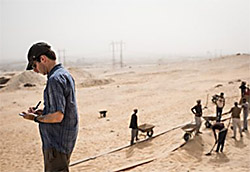
At an archeological dig in Egypt.
But the historical moments that we witnessed were very different, and in some ways opposite. We arrived in Egypt during the first year of the Egyptian Arab Spring, and we witnessed some incredibly intense political events, like the election of the Muslim Brotherhood president and the military coup of 2013. Whereas our years in China were very static, politically speaking. But China was undergoing great changes in terms of its economy and culture. Those were things that remained quite static in Egypt.
The Arab Spring was basically a political movement, not a cultural movement. It didn’t really challenge the traditional patriarchal structures, the ways in which men treated women, or the ways in which elders treated the young.
In my book, I have a couple of chapters about Chinese who were living in Egypt, because they tended to see these dynamics quite clearly. They didn’t believe that Egypt had really experienced a revolution.
From the Chinese perspective, the Egyptian Arab Spring was more a matter of a weak state collapsing, rather than a strong movement from below. I tended to agree with them. I think that Westerners tend to be obsessed with surface-level political movements, when it’s often the deeper cultural and personal trends that matter more.
Would you advise anyone who wants to write to have an extensive cross culture experience as you had?
Definitely. I joined the Peace Corps because I thought, in a kind of vague way, that it was bound to make me a better writer. A lot of this was a matter of maturity — the challenges of those years forced me to grow up, and that improved my perspective as a writer. But it also gave me material. When you’re interested and engaged by your environment, you are going to write better. And it’s more useful. I’ve always been motivated to write in China and then in Egypt because I feel like these are places we need to understand better. It pushed me to do my research and try to write about it in an interesting and coherent way.
Studying Chinese and then Arabic also enriched my life greatly. Any time that you seriously study another language, especially a challenging language, it changes your thought patterns. Now there are certain things that I tend to think about in Chinese, and other things that come to my mind in Arabic.
It’s such a wonderful experience to feel your mind expand like that.
Do you have any suggestions or advice for people starting out to write their first book?
Every book is different, and every writer is different. It’s hard to have a general piece of advice. But generally a writer has to be willing to take some risk. Maybe it’s the risk of moving to a new country, or maybe it’s the risk of writing a first draft on spec, with no guarantees. First books rarely come about because somebody else is asking for them.
In 1998, nobody was telling me: “We really need a book about a small city on the Yangtze River that people haven’t heard of.” In fact, when I first sent the book out, a number of publishers said specifically that nobody would be interested in it! So it depended on my own faith and effort. Usually a young writer is in that position.
At Princeton, taking writing courses, what do you remember most, and what was the most helpful to you at that stage of your life and career?
Princeton was unusual in the 1990s because its creative writing program was focused on undergrads, not grad students. I think this is really important. By the MFA level, a lot of things have become professionalized, and students might be less flexible. They’ve made the decision to be fiction writers, or nonfiction writers, or writers of a certain type of book. They go in that direction and the degree allows them to teach and support themselves. It’s fine, but sometimes it’s useful to reach people at an earlier stage, before they’ve committed.
My class at Princeton was really strong in terms of the fiction majors, and it was striking how people went off in very different directions. Akhil Sharma continued with fiction and became very successful. Nick Paumgarten and I both shifted to nonfiction, and eventually wrote for The New Yorker. Laurent Dubois became a historian of Haiti and wrote some really important historical books of that country. David Treuer did a Ph.D. in anthropology, and then wrote fascinating novels about the Native American culture in which he had grown up. Doug Trevor teaches English literature at Iowa and writes fiction. Catherine Curan became a journalist and reported on the financial world while also doing fiction. It’s a really interesting range, and it reflects how people can take this experience in quite personal directions.
For me, the exposure to nonfiction was key. I was mostly focused on fiction, but then taking John McPhee’s writing class made me realize that there were many ways to be creative with nonfiction.
Then, the summer before my senior year, I had a summer job through the University of Missouri, researching and writing an ethnography about a small town in southeastern Missouri. A foundation was setting up social programs and the first step was to have researchers go into communities and write ethnographies. This was totally unconnected with my coursework — it was a summer job that I took simply because it allowed me to live with my parents, in Missouri, with minimal expense.
The university would fund me to go into the southeast for a week at a time and do my interviews. It was a great experience that taught me so much about interviewing people, analyzing community dynamics, and putting research material together. It was so much more useful than if I had taken an internship at a major newspaper for the summer. With the ethnography, I was fully in charge of the project and I did it alone. I consider it to be one of the most important educational experiences I had, even though it was not connected at all to my studies at Princeton.
You are an established writer with a half dozen published books and writing for The New Yorker, as well as other major publications. What challenges are you facing now as a professional writer?
I’ve been fortunate in that I’ve been able to support myself as a writer. It’s not very common these days. It helped that I was in China when it was cheap to live there, and when the interest in the country was growing. And to be honest it probably also helped that I married and had children late. I was almost 41 when my daughters were born. I was already established as a writer, and I had saved up money.
It allowed me to build a house in Colorado, which gives us some stability. There’s a balance. Leslie and I feel like being in one place for the long haul is too static. We thrive on new material and new challenges.
But it’s important, both practically and psychologically, to have a base. Colorado is the place where we can go with our finished material and write our books in a comfortable and familiar environment. It helps me keep going. Egypt was so demanding as a place to live — it was an incredible experience, but it also exhausted both of us. We were worn out by the end. But in Colorado we’ve been able to recover while processing our notes and writing our books. And now I’m ready for the next challenge. We plan to move back to China in 2019, and I’ll see how the place feels after I’ve been away for more than a decade.
I think that’s the main challenge. As a writer gets older, he or she has to maintain energy. It’s hard to do good reporting — there’s a lot of travel and a lot of long days when you’re not sure where the material is going. It’s an issue of endurance. But if you get the rhythm right, it’s enjoyable.
I enjoy the excitement and the promise of finding new material, and that’s partly because I know that eventually I’ll reach the stage where I go back to Colorado and do my writing.
The magazine work is also part of the rhythm. I do stories for The New Yorker, and some of these projects continue to become books or parts of books. Managing that balance requires deliberate thought.
I structured my New Yorker contracts so that my commitment is open — I don’t have to write a certain number of stories or words every year. It gives me the flexibility to shift to book writing when the time is right.
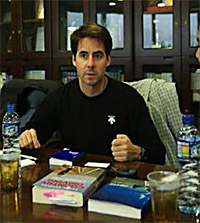
Ready for work.
Peter, what do you imagine your next book will be on?
Broadly speaking, it will be about China. I have a specific plan that is now taking shape, but it’s still too early to say anything about it publicly. I need to get back to China and see how things proceed, and then I’ll know enough to talk about it. Right now there are still too many different directions in which the project could go. But that’s one of the good things about this field — freedom and flexibility.
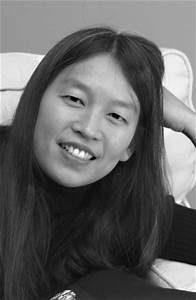
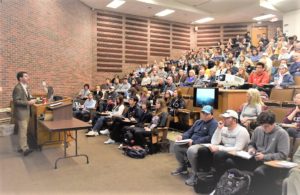
I have really enjoyed Peter`s books. All five with River town being my favorite. Looking forward to the next book about China.
God bless
I heard Peter Hessler give two back-to-back speeches at the University of Pittsburgh, one in the Cathedral of Learning. Beforehand, I bumped into him in a cafe and was able to tell him, “You are the reason I went to China” [on a Fulbright Teaching Scholarship]. His book River Town: Two Years on the Yangtze is excellent.